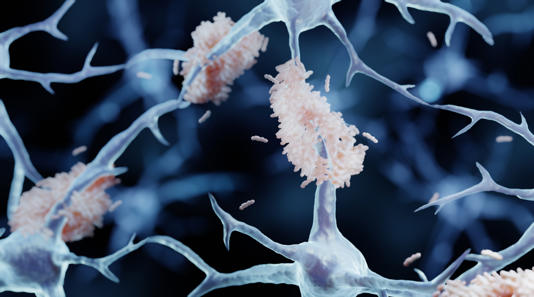Your competent? doctor needs to be following this closely to see what interventions might come out of this. At least if you have a functioning stroke doctor!
Your chances of getting dementia.
2. Then this study came out and seems to have a range from 17-66%. December 2013.`
The latest here:
 Artist's impression of abnormal protein clumps forming in the brain. These clumps are believed to cause Alzheimer's disease.
Artist's impression of abnormal protein clumps forming in the brain. These clumps are believed to cause Alzheimer's disease.Artur Plawgo/Getty
We may be one step closer to understanding the complex mechanisms of Alzheimer's disease, thanks to new research from New York City's Rockefeller University.Alzheimer's affects roughly 5.8 million Americans, according to the U.S. Centers for Disease Control and Prevention. The progressive condition is characterized by memory loss and cognitive decline in regions of the brain involved in thought, memory and language. Scientists believe the condition is caused by an abnormal buildup of proteins in and around the brain cells, but exactly what triggers this process is still unclear. However, certain genetic variants can increase our likelihood of developing the disease.Specifically, a variant of the gene APOE appears in 40 to 65 percent of those diagnosed with the condition. The gene is involved in making the proteins that help carry cholesterol and fats through the bloodstream and exists in three common forms. APOE4 is the variant that is most commonly associated with Alzheimer's and exists in roughly 20 to 30 percent of the U.S. population. In a new study, published in the journal
Immunity, the Rockefeller team demonstrated that the risk associated with this genetic variant may come from its ability to wear out the brain's own immune system. Our brains contain two main types of cells: neurons and glia. The neurons are like our brain's wires, transmitting chemical signals throughout the brain and body. Meanwhile, the glia act as cellular electricians, protecting and maintaining our neurons. Among these glial cells are the microglia, the brain's own specialized immune cells. These immune cells play an important role in cleaning up any molecular debris in the brain, protecting us from those abnormal protein buildups that can lead to Alzheimer's. But over time, the cells can become tired, worn out and less efficient at cleaning up these malicious molecules. "Older mice, and those with the APOE4 variant, have these exhausted, fatigued immune cells in their brains, and we discovered a similar phenomenon in human data sets," Sohail Tavazoie, the Leon Hess professor at Rockefeller, said in a statement. Alon Millet, a graduate fellow in the Tavazoie lab, said: "[These exhausted cells] marinate in this inflammatory milieu for years, until they're no longer able to cope. If we can revert them back to a healthy state, perhaps the immune system would be able to keep Alzheimer's in check." As well as shining a light on the mysterious mechanisms underpinning the disease, the team's discovery could provide useful insights for the development of future treatments. In their study, the team demonstrated that a recently approved Alzheimer's drug, aducanumab, can improve Alzheimer's symptoms by rehabilitating these damaged immune cells. Interestingly, the mice in the study with the APOE4 variant saw significantly more pronounced improvements in their condition after taking the drug, compared with those with other forms of APOE. "This may be a first hint that aducanumab works differently with different genotypes," Millet said. "It's something that clinicians should look into."

No comments:
Post a Comment